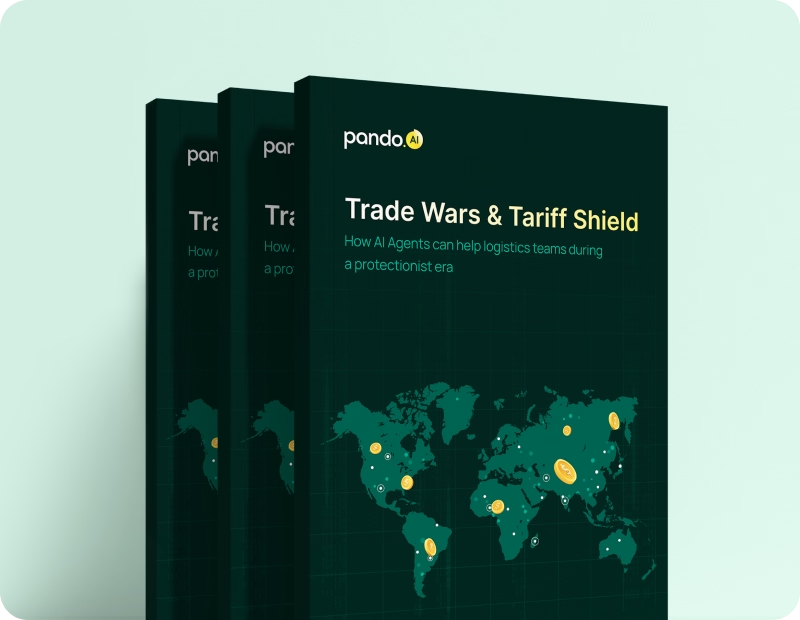-
Products Products
- Industry
- Initiatives
- Resources
- Company
- Book a demo
-
Products Products
- Industry
- Initiatives
- Resources
- Company
- Book a demo
5 ways to leverage AI in your freight procurement process
Discover how AI can augment your freight procurement with intelligence and predictability.
Published on October 14, 2023 • 5 mins read
Durga Pratiha

Discover how AI can augment your freight procurement with intelligence and predictability.
Imagine a world where freight procurement is no longer a tedious, time-consuming task, but a strategic process that delivers real-time insights and actionable recommendations. Where carriers are matched with shippers perfectly, and costs are optimized seamlessly. Where disruptions are anticipated and mitigated proactively.
This world is already here, thanks to the power of artificial intelligence (AI). By leveraging the transformative potential of artificial intelligence (AI), organizations can ultimately augment talent productivity, bring more predictability and resilience.
In this blog post, we'll explore five key ways to implement AI in your freight procurement process, so you can experience benefits around productivity, reduction of manual effort, optimization of carrier selection, and more. Read on to find out how you can level up your freight procurement process.
1. Select the right carriers with automated freight matching
Automated freight matching, often powered by advanced AI systems, addresses the repetitive, often manual task of selecting the most appropriate carrier for your shipments. AI-driven solutions analyze multiple data sources while taking into account details like historical shipping data, real-time demand fluctuations, and comprehensive carrier performance metrics. This multifaceted analysis allows the solution to automatically pair shipments with carriers that are the best fit for the specific requirements of each load.
There are several advantages to implementing automated freight matching, such as drastically reducing time and effort in carrier selection, and speeding up the process from days to minutes. AI-driven systems consider multiple factors for carrier selection such as cost, capacity, past performance, proximity, and quality, to give a holistic view of the logistics landscape. This leads to more informed decisions and better outcomes. Based on changing demand & market conditions, AI continues to analyze and carrier choices in real-time.
2. Access predictive analytics for accurate demand forecasting
Artificial intelligence is being used to delve into extensive datasets, covering a spectrum of information, from historical shipment records to intricate market dynamics, and even external variables such as weather patterns. This advanced application of AI makes sense of a vast amount of data to extract valuable insights.
Effective demand forecasting is the cornerstone of efficient freight procurement. By accurately anticipating future demand, you can make well-informed decisions to ensure you have optimum capacity available when it's needed.
Predictive analytics empowers companies to fine-tune their procurement processes in several ways:
- Resource optimization: Ensure resources are used correctly, preventing shortages or excess during demand fluctuations, which keeps costs in check.
- Inventory management: Manage inventory levels through accurate forecasting and reduce the risk of running out of stock or having too much on hand. This saves money and prevents storage costs.
- Supplier relationships: Provide your suppliers benefits by aligning their production with the end-customer's needs, fostering better relationships across the supply chain.
3. Optimize your contracts and carrier modes to fit your business needs
When negotiating a contract, it's crucial to remember that there are numerous parameters at play, some of which are often overlooked or omitted. These oversights can lead to difficulties when it comes to executing the contract. To ensure a smoother and more efficient process, you should take the time to optimize your contracts and carrier modes to align with your specific company needs.
One significant advantage of using AI in contract optimization is its ability to analyze vast amounts of data quickly and accurately. AI algorithms can comb through your existing contracts to find key terms, pricing structures, and performance metrics. This allows you to identify opportunities for renegotiation or optimization, ensuring that you are getting the best possible terms from your carriers.
Additionally, AI can help you forecast demand and optimize carrier modes based on real-time data and historical trends. By analyzing factors such as order volumes, lead times, and customer preferences, AI can recommend the most cost-effective and efficient modes of transportation for your specific shipments. This not only reduces costs but also enhances customer satisfaction by ensuring timely deliveries.
Furthermore, AI-powered predictive analytics can help you anticipate disruptions in your supply chain, such as weather-related delays or traffic congestion. By proactively adjusting your carrier modes and contracts in response to these insights, you can minimize the impact of such disruptions on your operations and maintain a reliable supply chain.
4. Efficiently manage procurement events with intelligent execution
Effectively managing your freight procurement can be quite effort-intensive, especially when your current indirect procurement tool lacks essential features like Request for Quote (RFQ) or reverse auction capabilities. It's challenging to manually oversee the procurement process, especially when you're dealing with limited time and resources. However, here are a few ways to streamline your procurement efforts and make the most of your resources with the help of AI-powered functions on modern procurement solutions:
- Automate routine tasks such as vendor selection and purchase order creation, significantly reducing the administrative burden on procurement teams.
- Provide real-time insights and allow teams to monitor procurement events, identify potential risks, and adjust strategies accordingly.
- Enhance procurement compliance by analyzing contracts and purchase agreements for discrepancies and ensuring adherence to legal and regulatory requirements. This reduces the risk of non-compliance and associated penalties.
5. Gain insight into supplier and carrier performance to drive data-backed decision-making
Continuous improvement is ensured through regular assessments of supplier and carrier performance, allowing you to identify areas in need of enhancement and adapt to evolving demands and performance standards.
A modern AI-powered procurement solution can help automate KPI analysis, providing real-time visibility into supplier and carrier performance to help pinpoint top performers. Armed with data-backed insights, you can make informed decisions and negotiate better rates with high-performing suppliers while addressing issues with underperforming carriers.
Proactive issue resolution is another benefit as AI detects problems in real-time, reducing supply chain disruptions and enhancing reliability. You can customize AI systems to track specific KPIs aligned with your organization’s goals, tailoring the analysis to meet your unique supply chain requirements and objectives.
Unlocking efficiency and agility through AI in freight procurement
The freight procurement process plays a pivotal role in the success of any organization's supply chain. Implementing AI in this process can lead to significant improvements in efficiency, cost reduction, and customer satisfaction. By automating tasks like freight matching, enhancing demand forecasting, and analyzing supplier performance, businesses can stay competitive and agile in the ever-evolving logistics landscape.
As AI-powered technology continues to advance, organizations must embrace these innovations to remain at the forefront of their industry. So, leap into the world of AI-powered logistics and watch your freight procurement process transform for the better.
Subscribe to Pando blog and Crossroads newsletter now!
Stay up to date with the latest logistics, transportation, and supply chain tips and news.
Subscribe Here!













